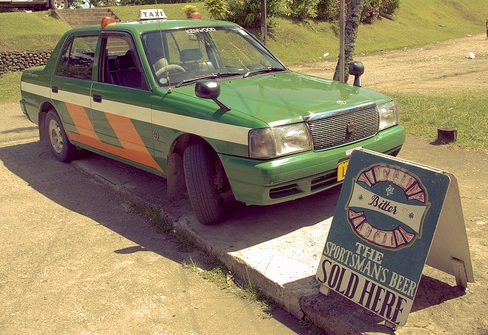
To see how deeply Australia reaches into the South Pacific, try the taxi test.
Hop into a taxi anywhere in the Islands and negotiate to pay the fare in Australian dollars.
My random survey over three decades finds it’s an easy negotiation anywhere in Melanesia and much of Polynesia, especially Tonga and Samoa.
The Oz dollar fails the taxi test in Cook Islands, where the cabs can’t see beyond New Zealand. Interestingly though, Oz currency is often acceptable in New Zealand cabs. The Kiwi cabbie, of course, lives by standard Kiwi rules about exploiting gormless Australians, so usually wants to do the exchange rate at one-for-one; robbery more outrageous than the banditry at airport currency kiosks.
In Melanesia, the taxi man can be relied on to know the going exchange rate to the second decimal. Allowing for commission, tip and rounding up for the whole note, it tends to be a fair exchange. Plus, it breaks the conversation ice. And interviewing taxi experts on current issues of politics, diplomacy and gossip is a standard rule of the travelling hack’s handbook (foreign correspondent chapter). In the Islands, the coconut wireless tells amazing stories—and the most amazing thing is how often they’re true.
My taxi research methodology is slapdash. The survey began merely because I was usually in a hurry, the banks always seemed to be closed, and the exchange rate offered by pubs is as extortionate as airports. After a while, though, it became part of the fun of the Pacific. The findings are offered as fact-based on another hack handbook rule: one incident is an anecdote, two constitute a trend, three similar events are hard statistical evidence. You can see the fellow feeling for the coconut wireless.
Turn now to the places where the Oz dollar doesn’t amount to fair exchange for a fare. In Micronesia, the greenback rules—only the US dollar will do. And several times over the years, attempts to do the deal in New Caledonia got a non, variously bemused, amused or straight contempt delivered with that hauteur the French are so good at.
To give the full French flavour, in several senses, I was in Noumea covering a visit by Australia’s Foreign Minister in the early 90s when it was announced with a flourish that the import duty imposed on Australian cheeses would be lifted. A cheerful French official advised this was because the relationship was improving after a bad period, plus Gareth Evans was a delightful man, despite his dreadful French (see my account here of Gareth trying to tell a joke in French) and New Caledonia was opening to its neighbours. Off the record, the French official concluded, lifting the duty wasn’t evidence that Australian cheese had actually improved.
With all that as prelude, I report an interesting finding—Noumea has changed sides on the taxi test. The Oz dollar is now as acceptable as the Euro and the French Pacific franc. And—zut alors!—the shops around the port are displaying prices in Oz dollars as well.
The reason for the shift is the giant cruise ships that now ply the South Pacific, sailing from the Oz east coast. In season, a dozen of these behemoths call in port each month, disgorging thousands of passengers, the great majority of them Australians. The extraordinary growth of cruises in the South Pacific in the last decade underlines an old lesson—relatively small shifts by Australia can have big impacts in the Islands. This is a new industry with a lot of history.
Australians heading to board their liner in Sydney, berthed by The Rocks near the old Sailors Home and the Maritime building, will speed by the Burns Philp building in Bridge Street, standing in testament to the great South Pacific shipping company that started off sailing tourists to PNG in 1884.
Going out into the South Pacific, Australians are surprised to find the Islands know us a lot better than we know them. Indeed, they remember our history in the region better than we do. Just ask the older caldoche cohort in Noumea whose vision of perfidious Oz recalls the Australian Navy turning up in the harbour early in World War II to ensure New Caledonia stayed true, no matter what happened in Vichy France.
The simple moral is that Australia matters in the South Pacific. And sometimes we have impacts without even realising that we’ve hit. Almost any taxi driver can tell you that tale, for only a small commission.
Graeme Dobell is ASPI’s journalist fellow. Edited image courtesy of Flickr user emmett anderson.

